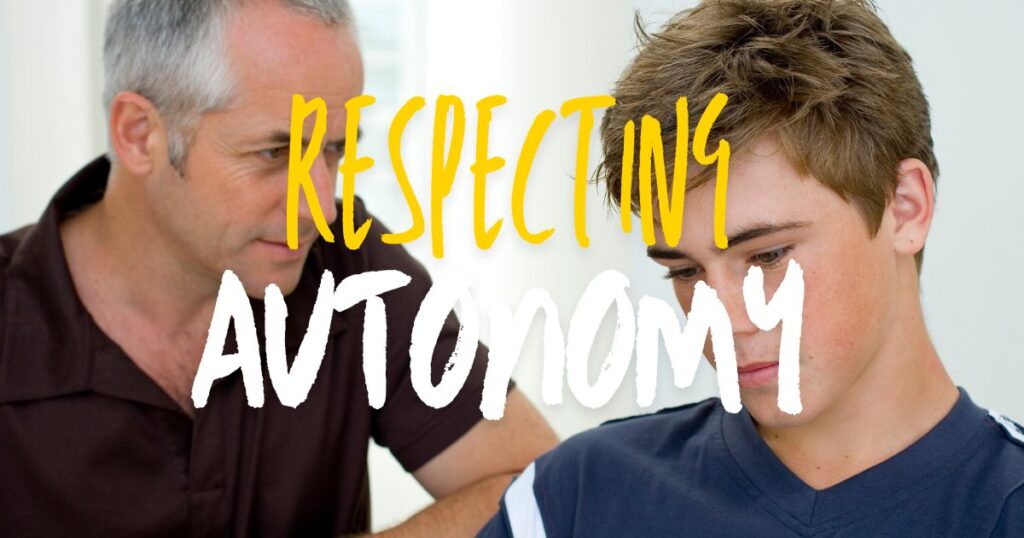I was reading some recent poll results, outlining common parental behaviors that frustrate teenagers, and they painted a vivid picture of the delicate balancing act inherent in modern parent-teen relationships. These frustrations are not merely superficial annoyances; they reflect deeper struggles for autonomy, respect, and understanding during a critical developmental phase. Analyzing these points reveals key insights into the teenage psyche and the challenges parents face when navigating this complex time of growth. Three frustrations at the top of the list were “invasion of privacy,”“inconsistent rules,” and “disregard for (their child’s) opinions.” As a parent, I believe you have the right to impose your will on any of these three areas, but if you will continue on with me, there are different and often more successful approaches than imposing your will to bring your child around to your way of thinking.
Invasion of privacy
The concept of “invasion of privacy” resonates deeply with teenagers today, extending beyond digital spaces to encompass their physical environments and personal belongings. From the vast digital landscape where personal expression is curated online, to the sanctity of their bedrooms and the contents of their drawers, teenagers want to guard their sense of autonomy fiercely. Checking phones, social media, diaries, or even entering their rooms without permission feels like a profound violation to them, which could feel to them as if you, the parent, are undermining their developing sense of self-reliance. For teens, these spaces—both virtual and physical—represent a sphere of control in a world where they often feel powerless.
While I believe it’s true, for the most part, that parents often retain ownership of their teenager’s room, devices, and possessions, a more nuanced approach might be considered for you to parent well, and for our children to thrive. Viewing our children’s personal items as “loans” contingent on responsible use is valid, but it shouldn’t negate the importance of fostering a collaborative and respectful environment. The key lies in shifting from a position of absolute control to one of shared responsibility and gradual autonomy.
The counter to this “invasion of privacy” frustration requires a delicate balance between parental guidance and respect for emerging independence. Here’s a framework for addressing this issue:
1. Open communication and collaborative boundary setting
- Establish a dialogue, not a dictatorship: Instead of unilateral decisions, initiate open conversations about online safety, responsible technology use, appropriate room privacy, and the handling of personal belongings. Explore your teen’s perspective, and understand their frustrations.
- Co-create guidelines: Involve your teenager in establishing guidelines for technology usage, room privacy (e.g., closed-door policies), and the use of personal items. This fosters a sense of ownership and accountability.
- Transparently explain concerns: Share your anxieties about online risks, inappropriate content, or concerns about their well-being, but do so calmly and without judgment. Explain your reasoning behind requests for open doors or occasional checks of personal property.
2. Shift from surveillance only to alternative monitoring and guidance
- Transparent use of parental controls: If you’re using parental-control software, be upfront about it. Explain its purpose and how it will be used, but also praise responsible actions you observe. We need to communicate to our kids that we notice when they are getting things right.
- Focus on observable behavior and communication: Pay attention to changes in mood, behavior, or sleep patterns, which can indicate underlying issues. Encourage open communication about online experiences, social interactions, and personal struggles.
- Prioritize education and dialogue: Teach your teenager how to identify and avoid online risks, manage their time effectively, and maintain healthy boundaries. Review expectations regarding personal property and room privacy, and be open to granting more autonomy as they demonstrate responsibility.
3. Cultivate trust and gradual independence
- Start with a foundation of trust: Assume your teenager is capable of making sound decisions until proven otherwise. This fosters a sense of responsibility and encourages them to live up to that trust.
- Gradually grant more freedom: As your teenager demonstrates responsible behavior, gradually loosen restrictions, and give them more control over their digital lives, personal space, and belongings.
- Emphasize guidance over control: Focus on educating and empowering your teenager, rather than solely relying on surveillance and restrictions.
Key considerations:
- The level of oversight should be age-appropriate, with younger teens requiring more guidance, and older teens needing more autonomy.
- Trust is earned through consistent, responsible behavior.
- Open and honest communication is crucial for bridging the gap between parental concerns and teenage desires for privacy.
By adopting these strategies, parents can foster a healthy balance between protecting their teenagers and respecting their growing need for privacy and autonomy. This builds a foundation of trust and mutual respect.
Inconsistent rules
“Inconsistent rules” are a breeding ground for teenage frustration and resentment. They disrupt the sense of predictability and fairness teenagers crave, even if they outwardly appear to reject structure. Predictable boundaries are not merely about control; they provide a crucial framework for adolescents to navigate their rapidly changing world, fostering a sense of security and stability. When rules are constantly shifting or applied selectively, it undermines trust in parental authority and creates a sense of chaos.
Teenagers are in a phase of life marked by sometimes intense emotional and physical changes. They are grappling with identity formation, hormonal fluctuations, and the pressure to navigate complex social dynamics. In this turbulent landscape, consistent rules provide a sense of grounding. They offer clear expectations, allowing teenagers to understand the consequences of their actions and develop a sense of self-discipline.
Inconsistent rules, on the other hand, create confusion and a sense of unfairness. When rules are applied arbitrarily, teenagers feel as if they are being treated unjustly. They may question the validity of parental authority and become more likely to rebel. For example, if a parent allows one sibling to break a rule but punishes another for the same offense, it creates resentment and distrust. Similarly, if a rule is enforced one day but ignored the next, teenagers may feel like their parents are unpredictable and unreliable. You should also know that they are smart. When they see inconsistencies in play, they will figure out a way to manipulate the situation to their advantage, and their desired outcome becomes driven more by what they can get, than honoring your expectations.
The lack of consistent boundaries can also lead to anxiety and insecurity. Teenagers need to know where the lines are drawn to feel safe and secure. When those lines are constantly shifting, it creates a sense of instability. They may feel like they are walking on eggshells, constantly worried about crossing an invisible boundary.
Furthermore, inconsistent rules undermine the development of self-regulation. Teenagers learn to regulate their behavior by observing the consequences of their actions. When those consequences are inconsistent, they struggle to develop a sense of internal control. They may become impulsive and reckless, as they don’t know what to expect.
Even though teenagers often push back against rules, they crave structure. Deep down, they want to know that their parents are in control and that they have their best interests at heart. Consistent rules provide a sense of security and stability, allowing teenagers to focus on the important tasks of adolescence, such as identity formation and social development.
To create a more harmonious environment, parents should strive to establish clear and consistent rules that are age-appropriate and reasonable. These rules should be communicated clearly and enforced fairly. When exceptions are made, they should be explained and justified. Involving teenagers in the rule-making process can also foster a sense of ownership and increase compliance.
By providing predictable boundaries, parents can create a sense of security and stability for their teenagers, fostering trust and promoting healthy development. While teenagers will still push boundaries, they will do so within a framework that they understand, which leads to a more positive parent-teen relationship.
Disregarding their opinions
Disregarding your teen’s opinions is a potent form of invalidation that can wound deeply. During adolescence, individuals are undergoing a profound transformation, forging their own identities and grappling with complex ideas. Dismissing their opinions, even unintentionally, sends a clear message: “Your thoughts don’t matter.” This can lead to a sense of profound disrespect, frustration, and alienation, creating a chasm in the parent-teen relationship.
Teenagers are in the crucial process of developing their own belief systems and value frameworks. They are exploring different perspectives, questioning established norms, and forming their own understanding of the world. When parents dismiss their opinions, they are essentially telling their teenagers their intellectual and emotional development is inconsequential. This can lead to feelings of inadequacy, self-doubt, and a sense of being misunderstood.
The impact of disregarded opinions extends beyond immediate frustration. Teenagers who consistently feel their voices are ignored may become withdrawn, reluctant to share their thoughts, and distrustful of their parents. They may also develop a sense of resentment, feeling that their parents don’t value them as individuals. This can lead to a breakdown in communication, making it even more difficult for parents to connect with their teenagers.
Dismissing a teenager’s opinion also can hinder their ability to develop critical thinking and communication skills. When their thoughts are consistently dismissed, they may stop engaging in meaningful discussions, leading to intellectual stagnation. Conversely, when parents actively listen and engage in respectful dialogue, they are fostering intellectual curiosity and encouraging their teenagers to articulate their ideas clearly.
The key to avoiding this pitfall lies in active listening and respectful dialogue. Parents should strive to create a safe and non-judgmental space where teenagers feel comfortable sharing their thoughts and feelings. This involves:
- Truly listening: Pay attention to what your teenager is saying, both verbally and nonverbally. Avoid interrupting or dismissing their ideas prematurely.
- Validating their feelings: Acknowledge their emotions, even if you don’t agree with their opinions. You can say things like, “I understand why you feel that way,” or “That’s an interesting perspective.”
- Asking open-ended questions: Encourage them to elaborate on their thoughts and provide more context. This shows that you are genuinely interested in their perspective.
- Engaging in respectful debate: Even if you disagree with their opinions, engage in a respectful discussion. Present your own perspective calmly and rationally without resorting to condescension or criticism.
- Finding common ground: Look for areas of agreement and build upon them. This can help bridge the gap between differing opinions and foster a sense of connection.
- Admit when you are wrong: Parents are not always right, and admitting a mistake, or a change of opinion, will show your teen that you value the truth — and their input.
One last thing: at no time should your child be empowered to debate every issue with you. Parenting is often an art, not a science, because not every approach works the same for every child. Here’s the bottom line when it comes to listening to their opinions: let your child know you are in charge, and you get the final word — but you also are interested in their thoughts and perspectives. What you really want to do is open the door for your child to offer some considerations you might not have been aware of. Don’t entertain a debate because they desire a different outcome. By actively listening and engaging in respectful dialogue, parents can show their teenagers that their opinions matter. This not only strengthens the parent-teen relationship, but also fosters intellectual growth, builds self-esteem, and encourages open communication.
Ultimately, fostering a healthy parent-teen relationship hinges on understanding, communication, and a willingness to adapt. While parental authority is essential, it doesn’t have to come at the cost of your teenager’s sense of autonomy and respect. By embracing a collaborative approach, we can guide our teens through this challenging phase while building stronger, more meaningful connections. Let’s strive to create a partnership where both parent and child feel heard, valued, and empowered to grow.

